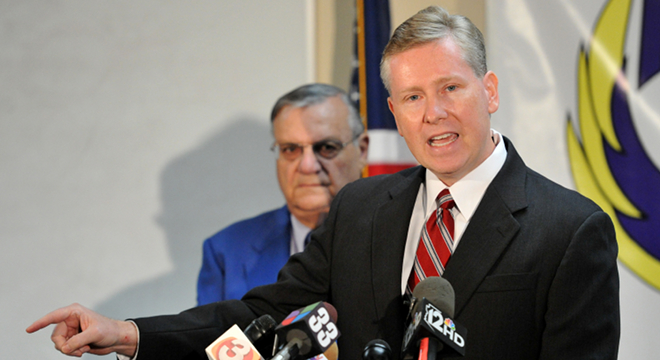If things went differently, Andrew Thomas might have had a bright career in Arizona politics.
In six years as the top prosecutor in Maricopa County, he stood side-by-side with Sheriff Joe Arpaio and earned a reputation as an aggressive and ambitious politician. A pair of conservative warriors in a Republican stronghold, the two teamed up to push for tougher treatment of illegal immigrants and to pursue what they saw as widespread corruption by local government officials.
But somewhere in the process, according to ethics investigators who scrutinized his actions in recent years, Thomas became obsessed with his political enemies. With Arpaio’s help, he targeted them with criminal investigations, had some of them arrested and some charged with crimes. The evidence he and Arpaio used in the process was often questionable. The charges rarely stuck.
Later today, the former prosecutor, who graduated from Harvard Law School the same year as Barack Obama, is facing the possibility of being disbarred for his role in the crusade.
Ethics investigators with the State Bar of Arizona have accused Thomas of a spree of bad acts, saying he abused his authority even to the point of committing crimes himself.
He “undermined the public trust and inflicted great damage to the system of justice,” the investigators wrote in December. “The only way to restore that trust and to repair the damage to the system is to disbar Thomas.”
The investigators have also called for one of Thomas’ top aides, Lisa Aubuchon, to be disbarred and for another aide, Rachel Alexander, to have her license suspended.
A judge in Phoenix is scheduled to unveil the decisions on all three cases at noon ET.
Thomas has argued for years that he is a victim of a widespread conspiracy by Arizona’s political establishment. In January, as part of their final filing on his behalf, Thomas’ attorneys called the case a witch hunt.
“We have found a witch! May we burn her?” they wrote, citing Monty Python.
Thomas first came to prominence in Arizona in 2002, winning the Republican nomination for attorney general. He lost the general election to Terry Goddard, a Democrat, but cemented his role as a conservative up and comer.
Two years later, he won the race for Maricopa County attorney, putting him in charge of felony prosecutions and other legal matters of a community of more than 3.5 million people. It set him on equal footing with Arpaio and a team was born.
As a duo, they frequently butted heads with other local officials. They went to battle over their budgets with the Republican-controlled county Board of Supervisors. They often vocally disagreed with judges who ruled against them.
Then things really got ugly.
Just weeks after both were reelected in 2008, the two men began using their offices to target many of the same officials they had battled with in the years prior.
During the next year or so, Thomas and Arpaio announced criminal investigations against at least 14 officials, including all five members of the Board of Supervisors, four judges, the county’s top two appointed officials, a high-ranking attorney for the county and two private lawyers.
Thomas and Arpaio filed a major lawsuit against the group, accusing them of corruption and racketeering. Thomas also charged three of them with crimes, warning charges may be coming for the rest. “No one is above the law,” he said at the time.
Soon, however, the cases began to crumble. In some instances, the evidence that was promised by Thomas and Arpaio never materialized. In other instances, independent judges ruled that Thomas’ office filed charges on allegations that were well past the statute of limitations.
Ethics investigators have since said Thomas and Aubuchon knew those charges were bogus but filed them anyway to ruin the reputations of the accused. The investigators described this as perjury. Thomas insisted that the cases were good and the people he was targeting were corrupt. But in early 2010, he hit the eject button.
Amid all the chaos he helped sow, Thomas resigned his office a little more than a year into his second term to take another shot at becoming the state’s attorney general. The decision essentially put an end to most of the feud, but the problems for Thomas were only beginning.
The prosecutor who took over from Thomas ended up dismissing the remaining cases against the public officials that same year. He also offered to hand over records to state ethics investigators as well as federal prosecutors, who had already launched a criminal investigation into the actions of Thomas and Arpaio.
As a result of the chaos, Thomas, Aubuchon and Alexander were the subjects of an extraordinary two-month hearing last year that amounted, really, to a trial about whether they should keep their law licenses. The three of them testified at the trial, as did Arpaio and an array of officials who were tangled up in the mess.
That trial could end Thomas’ legal career. The criminal investigation is believed to still be ongoing. Meanwhile, Thomas lost the Republican primary for attorney general in 2010 to an opponent who used the feud to paint him as corrupt and out of control.










